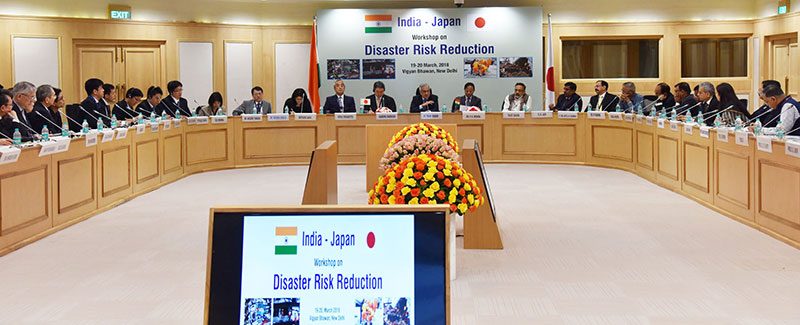First India-Japan workshop on Disaster Risk Reduction inaugurated
The Vice Chairman, NITI Aayog, Rajiv Kumar inaugurated the First India-Japan Workshop on Disaster Risk Reduction on March 19. The two-day workshop was jointly organised by the ministry of home affairs, National Disaster Management Authority (NDMA) and government of Japan.
Speaking on the occasion, Kumar underlined the synergy between the two ancient Asian civilisations of India and Japan, both of which have frequently witnessed the fury of natural catastrophes and are investing proactively on mainstreaming risk reduction into development. He said that this workshop ‘marks the beginning of formal implementation of the initiatives agreed under the Memorandum of Cooperation signed between the two countries on Disaster Risk Reduction in September 2017’.
While underlining the impact of disaster on development, Kumar stated that uncontrolled development without proper disaster risk assessment has increased the risk of losses from disasters. He added that climate change has further aggravated the disaster risk. “Therefore, disaster risk management can no longer remain isolated from the overall strategy of sustainable development”, he said.
Recalling commitments made in Sendai on Disaster Risk Reduction, in Paris on Climate Change and in New York on Sustainable Development Goals, Kumar emphasised the role of country leadership for implementing the commitments particularly in the field of Disaster Risk Reduction, as returns to investment are not easily visible. He said that “Disaster Risk Reduction should be seen not as a cost to economic growth, but rather as a valuable asset for the country”.
The Vice minister for Policy Coordination in the Cabinet Office, Japan, Mamoru Maekawa, thanked the government of India for hosting this workshop, which is the first outcome of the Memorandum of Cooperation regarding Disaster Risk Reduction (DRR). He shared the Japanese experiences of DRR policies, including legal and planning framework, and discussed how Japan is preparing against mega-scale disasters, in collaboration with government, academia, private companies and citizens. He concluded that Japan and India could collaborate for the implementation of the Sendai Framework so as to contribute to Disaster Risk Reduction globally.
Additional Principal Secretary to the Prime Minister of India, P. K. Mishra talked about the unparalleled contribution of Japan to global Disaster Risk Reduction. He appreciated their consistent global leadership in this area from the early days of the International Decade of Natural Disaster Reduction (IDNDR) to Yokohama Strategy, to Hyogo Framework to the current Sendai Framework. Mishra lauded Japan’s lead in technology and its all of society approach in DRR. He stressed the need for imbibing the principles of Disaster Risk Management in all development sectors so as to prevent economic losses.
Ambassador of Japan to India, Kenji Hiramatsu, expressed his gratitude to the people of India for sending the team of National Disaster Response Force (NDRF) to Japan, who extended their unstinting assistance in the aftermath of the Great East Japan earthquake in March 2011. He also mentioned about the various cooperative projects related to Disaster Risk Reduction (DRR) which are currently ongoing between Japan and India; and emphasised the importance of people’s awareness and precautionary measures for DRR.
Union home secretary Rajiv Gauba, senior officers from MHA, NDMA and NDRF were also present during the inaugural session.


